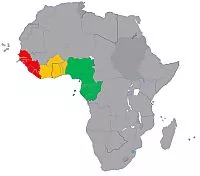Nigeria's All Progressives Congress (APC) elected Bola Tinubu to be its candidate for the 2023 presidential election today. As we forecast here, the main opposition People's Democratic Party (PDP) has also chosen Atiku Abubakar as its own candidate. The stage is now set for another contest between the country's north and south.
Significance – Battleground
The two main parties have put forward their most experienced aspirant for the presidential election next year. Atiku (northeast Adamawa) was an aspirant for the 1993 presidential election that was annulled by the military ruler Ibrahim Babangida, while Tinubu (southwest Lagos) was one of the opposition politicians who formed the National Democratic Coalition (NADECO) to fight for a return to civilian rule. He then became governor of Lagos state when the army gave up power in 1999, while Atiku was elected vice president. Both politicians would argue that it is their turn to run the country. Atiku is a founding member of the PDP while Tinubu helped to form the opposition alliance that created the APC in 2014 and brought President Muhammadu Buhari to power the following year.
Now, Tinubu is the most powerful politician in the southwest and is backed by the ruling APC's northern state governors who control most of that region – and are angling for a role as running mate. This means he will look to draw the most electoral support from the southwest and the northwest. The northwest is President Buhari's home area and accounted for 31% of all votes in the 2019 presidential election1. On the other hand, the PDP's base is mainly in the southern Niger Delta, the southeast and Atiku's northeast home area. Finally, the six states in the central north provided swing votes in the last three presidential elections, but five of them are now controlled by the APC (See: Nigeria 2023 battleground states).
The main election issue so far has been whether the next president will come from the north or south. The zoning rule stipulates that power must oscillate between the mostly Muslim north and largely Christian south every two terms or eight years. This implies that power should be transferred to the south this time because outgoing president Muhammadu Buhari is from northern Katsina and will have been in office for eight years in 2023. However, the distribution of votes in the last presidential election was exceedingly heavy in the north and so southern politicians in the two main parties struggled to invoke the zoning rule this time. The APC even appeared to have chosen a northern candidate when its chairman announced two days ago that President Buhari had instructed him to name Senate President Ahmad Lawan as the party's nominee (See background in What to know about Nigeria's presidential primaries).
This zoning dispute has overshadowed economic and security developments shaping the risk outlook in the background. For example, last week's deadly church attack in southwest Ondo raises concerns about the spread of terrorism and banditry that has mostly occurred in the north. A train attack outside the capital Abuja in April also remains unsolved and the kidnapped victims are still in captivity. Meanwhile, inflation is rising at 17%2 and GDP growth slowed from 3.98% to 3.11% in the first quarter of this year as oil output fell to the lowest since 2016 chiefly due to increased theft from pipelines. The resulting fall in petrodollar inflows continues to limit the capacity of authorities to curb currency depreciation.
Outlook – Campaigns
Campaigns will officially begin in September. Before then, Tinubu is expected to pick one of the APC northern governors as his running mate while Atiku will likely choose his own vice-presidential candidate among the PDP governors in the oil-rich Niger Delta. Governors have high electoral value because they control the treasury in their state and therefore run the party at the grassroots.
Zoning will remain the main talking point during the campaigns, and this election will effectively be viewed by the electorate as a contest between the north and south. Both candidates otherwise have mostly indistinguishable features in the eyes of voters. Both are considered old – Atiku is 75 while Tinubu is 65 but generally believed to be older than claimed. Both are tarnished by corruption allegations and both have for long been at the top of the political establishment.
However, Tinubu will likely campaign on continuing President Buhari's interventionism to appeal to the president's northern supporters, while Atiku promises to promote a greater participation of private investors in the economy – pointing to his role in the privatization of key sectors such as telecommunications during the Olusegun Obasanjo administration (1999 to 2007).
Footnotes
1. Independent National Electoral Commission. (2019, February 23). Declaration of Results [Press release]; BBC News. (2019, February 24). Nigeria Presidential Elections Results 2019.
2. Fourth highest in the region after Ghana, Burkina Faso and Sierra Leone.
The content of this article is intended to provide a general guide to the subject matter. Specialist advice should be sought about your specific circumstances.


